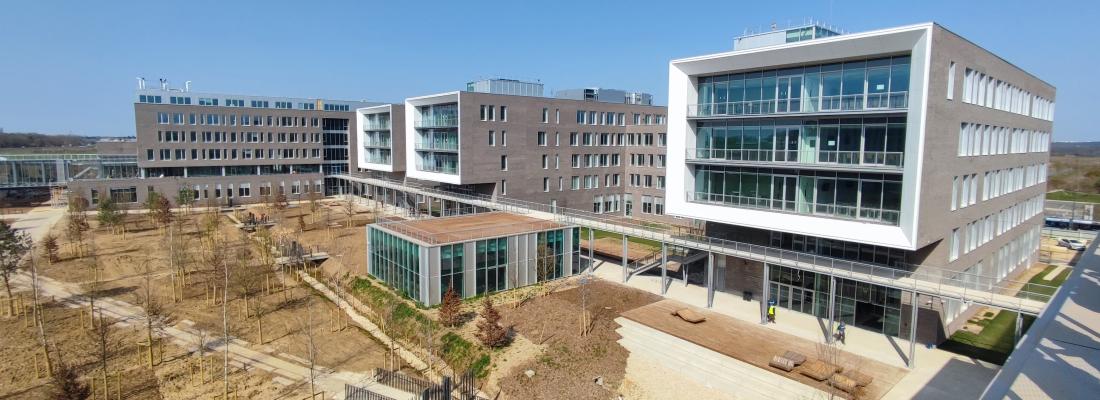Society and regional strategies Reading time 3 min
Inauguration of the Agro Paris-Saclay campus
Published on 20 April 2022

Now complete, construction of the Agro Paris-Saclay campus kicked off in January 2019. Covering 4.2 hectares in the commune of Palaiseau (Essonne), the campus will open its doors to the institutions' staff this spring, then to AgroParisTech students in September. It will offer everyone a quality environment conducive to work and exchanges within the academic community and, more broadly, with the partners of the Saclay plateau.
In order to carry out this operation, for which the investment amounts to €276 million, AgroParisTech has been able to mobilize a number of funds provided by the State (Campus Plan, Ministry of Agriculture and Food) and by the Île-de-France Regional Council or from loans or the sale of part of its real estate assets. These various public funds will enable the school to finance the project to the tune of €255 million.
The Agro Paris-Saclay campus will join a rapidly expanding scientific cluster, following CentraleSupélec and ENSAE Paris in 2017, and ENS Paris-Saclay and Institut Mines-Telecom in 2019. The new campus, located west of the École Polytechnique in Palaiseau, is adjacent to the EDF Lab, the Nano-INNOV site, and the business incubator and hotel inaugurated in 2019.
One third of the space is dedicated to research laboratories (including experimental greenhouses, growth chambers, a technology hall and a food zone), and one third to teaching (including two large lecture halls with seating for 400 and 150 respectively). The remaining areas are reserved for administrative and logistical purposes, as well as the spaces necessary for the life of the institution and its students. Eight buildings make up the complex, with nearly two hectares of a leafy garden. The entrance building, called the forum, is composed of a large glass canopy reminiscent of the design of experimental greenhouses. Completely transparent, it speaks to the site’s openness to the neighbourhood and the large public square that the EPA Paris-Saclay is building at its entrance: the Place de l'Agronomie. A central axis that structures the spaces runs through the large open garden, surrounded by five teaching buildings and two large buildings dedicated to research.
Starting in April 2022, the campus will welcome the first staff members of the institutions followed by 2,000 students and 1,350 teacher-researchers, researchers, technicians and administrative personnel of AgroParisTech and INRAE, all present on the same campus.
The Agro Paris-Saclay campus is a historic step for AgroParisTech. By bringing together its four Ile-de-France sites in a single place, where the institution's headquarters will be housed, the synergies between training, research, innovation and student life will increase significantly. The new campus will strengthen the links between graduating classes and training programs, as well as between the scientific disciplines and specialties covered by AgroParisTech and INRAE. For INRAE, nine research units at the forefront of research on agro-ecological and food transitions, representing nearly 300 staff, will move to the site by next autumn. Together, AgroParisTech and INRAE will represent nearly 12% of the workforce of the Université Paris-Saclay.
An attractive Agro campus, reinforcing the dynamics of the Université Paris-Saclay
As founding members of the Université Paris-Saclay, AgroParisTech and INRAE will join many other organizations, universities and grandes écoles in the same geographical area, concentrating nearly 15% of French research in one and the same place.
Launched in 2008, this large-scale project was carried out with the strategic objective of ensuring the continuum of training, research, innovation and transfer in agriculture, food, health and the environment within the campus. Research will determine the outcome of many pressing issues: mitigation of and adaptation to climate change, food and nutritional security, human health and the health of the planet, agricultural transition, preservation of natural resources, restoration of biodiversity, and risk anticipation and management. The Agro campus will make Paris-Saclay a leading research site in France to meet the challenges of agriculture, food, and the environment, and raise the international profile of French research in these strategic priority areas.
